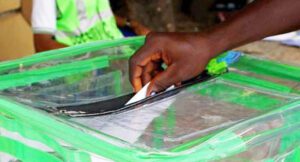Mmesoma and the rise in rot of our society
The Joint Admissions and Matriculation Board (JAMB) recently came out to say that it would withdraw the result of a certain Ejikeme Mmesoma, a 19-year-old student of Anglican Girls Secondary School, Nnewi, Anambra State for manually inflating her result and announcing herself as the top scorer for the 2023 Unified Tertiary Matriculation Examination.
According to a statement issued by the board, Mmesoma used her manually inflated score to attract a N3 million scholarship from Innoson Motors and was set to be honoured by the Anambra State government before she was exposed.
The examination board explained that several publications had been celebrating the 19-year-old of having the highest score of 362 in the 2023 UTME examination and that the reported success story of the young girl had been attracting several praises including that of Dr Innocent Chukwuma, the CEO of Innoson Vehicles who had already announced a N3m scholarship for her.
The board however said that it was unfortunate to discover that Mmesoma had all along been parading fake result because her actual score was 249 and not 362 as she had claimed. JAMB categorically disclosed that the young girl had joined league of irresponsible students who use funny application packages on computer to alter their marks to whatever suited them.
The examination body said a similar case was that of another Atung Gerald in Kaduna, who claimed to have scored 380 in the same UTME. His ethnic group was said to have taken the issue up, requesting that he should be given special recognition, only for the Board to disappoint them with the incontestable fact that Atung never obtained the 2023 UTME application documents, not to talk of sitting the examination
The board said, “It is to be noted that Miss Mmesoma had sent a message to the Board’s platform to request her UTME result, after which she manually inflated her scores and pasted same on the 2022 UTME result sheet. Unknown to her, the Board had changed the design of the 2023 UTME result sheet. Her original result remains 249, as nothing can change that.
“With this her ignoble act, Miss Mmesoma would be prosecuted and her original result withdrawn. This is not all, as the Board would, in due course, investigate all candidates laying claims to higher scores than they actually obtained. Once discovered, such candidates’ original results would be withdrawn forthwith, and they would be handed over to relevant security agencies for prosecution.”
But Mmesoma would not have none of this as she did a rebuttal via a video that had since gone viral claiming that the result she printed from the website of the examination body said scored 362.
She had said, “I am the owner of this result. I went to JAMB portal to print this result and this is what they gave me. This is my aggregate, 362. This is exactly how I printed it out and downloaded from the site,” she said.
“So, the fact that they are now saying I forged the result is what I don’t know. I am traumatised that they accused me of forging my own result. This is because I am not capable of forging my own result.”
Mmesoma even went to say that her academic brilliance did not just begin with her exploit in the 2023 UTME as she had come first in the Common Entrance done to gain admission from primary to secondary school.
Her response made many Nigerians to be so divided as some were arms up against JAMB attacking it for deliberately denigrating and shredding to pieces the dedication and efforts of the young girl while some supported the stand of the board.
However, Mmesoma’s denial had barely landed when JAMB vehemently insisted that it was right with its assertion that the young girl was parading fake result because the type of the result slip she was brandishing in the viral video was used last in 2021 when it was discovered that the students were forging their original results.
JAMB said even Mmesoma confirmed that the QR code on the result slip she was claiming to be hers when scanned revealed a different name, one Omotola Afolabi with aggregate score of 138.
The exam board said Mmesoma was undoubtedly parading fake result and as punishment, her original score of 249 had been withdrawn and would have to wait for another three years before she could write another UTME.
However, about four days ago while appearing before the panel the Anambra State government had set up to unravel this puzzle, Mmesoma lies collapsed like a pack of badly arranged cards.
She reportedly confessed to forging the result unaided and with this revelation, JAMB said it has proven again and again that it won’t sit by and allow any irresponsible citizen to impugn its integrity.
Lot of Nigerians have been so disturbed by the Mmesoma scandal. Not a few believed that such an innocent looking girl was capable of committing so grievous crime that could attract as much as seven years jail term if found guilty.
The disgraceful and unfortunate incident is said to be a reflection of the continued rise in the rot of our society which seems to be going on unchecked.
It is against this background that many are campaigning for serious national rebirth such that from the leaders to the led, everyone will be ready to do things rightly.
It is said that many of the coming generations are said to be learning so fast from the stupendous corruptive tendencies of the country’s handlers and will equally do so worse if we refuse to take seriously issues of fight against corruption and deteriorating morals.
It is the strong opinion out there that parents and religious leaders must like never before be more deliberate to join forces with all efforts to fight against corruption and moral decadence.
The Mmesoma scandal should be used as a spring board to relaunch campaign for national rebirth while the public enlightenment against corruption should also be taken to schools starting from primary schools in form of catching them young programme.
Above all, the unfortunate incident is also a good reason for President Bola Tinubu to see how horrible Nigerians have soaked in corruption and the need to get more serious in dealing with this monster which has for very long inhibited our growth and development as a nation.




